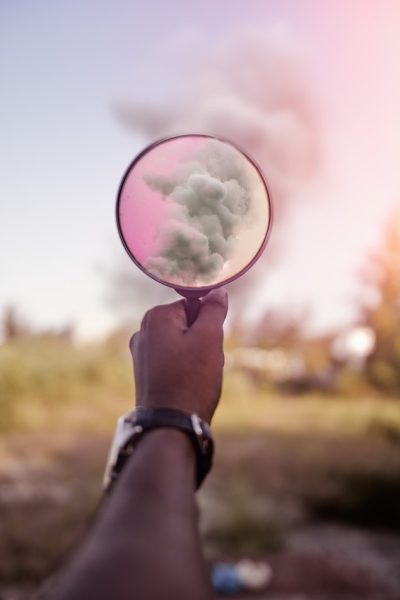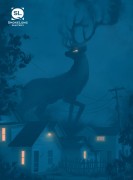Tell me about the process of writing this story. Where did the initial idea come from? Did you know it was going to be a flash story from the beginning?
Bits and pieces of “Satellite” sat in my drafts as the unfinished “astronaut apocalypse” suite for years, a sprawling ramble of a short story about someone sent into space just before the end of the world. Slowly, it became more about the person she was leaving behind, but in a longform piece there was still too much clutter. I’m a coward, and my words are, too. I’ll walk around and around the edges of something forever rather than say it outright. It took stepping back and writing some poetry about the first woman on the moon, some flash about a shipwreck, some creative Frankensteining, and a lot (a lot) of time to get this to a place where it could just brush up against all these immense ideas—space and the ocean and fear and love—without becoming overwhelmed by them. As a flash, the effect is (hopefully) subtle and artful, rather than just me being frustratingly, uh, noncommittal.
Though I should also add that this is a long way away from that original concept. I like to think Helen makes it home just fine!
There is a childlike wonder in this story that I love—the cartwheels, the idea of space, the simplicity of the way the story is told. It balances out the heavy bits about the dangers of traveling and the worry and love between these two people. Was this intentional? How did you strike that balance?
I like paradoxes. I like the way we collectively boil down ferocious, complex concepts into tiny, fragile, human words. I like the way we open the door to invite the world in even though we know that, eventually, the dinner party will end. Because our most interesting moments happen in the betweens, when we allow ourselves to feel and be multiple things at once, it’s important to me that, for instance, when I talk about my fear of losing you, the reason I’m afraid—that I love you—doesn’t itself get lost behind the fear.
I wouldn’t go so far as to call it intentional, but I’ve very clearly got a bias in that the way the narrator feels for Helen is echoed in the way she talks about space and the sea. There’s an awe, a tender reverence, in the way she approaches even their capacity for danger, and it’s my hope that in our search for anything we maintain that sort of unselfconscious curiosity and kindness, but especially when we look around at the world and at each other.
Strangely enough, my son and I practice our cartwheels every night before bed. Do you have any odd bedtime rituals?
My work schedule usually makes my only ritual a long drive home and then straight into bed, but on the days I’m off, my pre-bed bubble bath ritual is a sacred one. We’re talking vintage silk robe, two-candle minimum, lavender Epsom salts, glass of wine and a playlist of ’40s hits (heavy on the Ink Spots or bust).
What was the last book you read that made you depressed when it ended (because it was that good)?
Writer card revoked, but I haven’t felt this way about a book in a long time, which speaks less to the quality of the books out there than to the quality of my reading habits. I can say that at the moment I’m in the middle of Rilke’s Letters to a Young Poet, and I hope I never finish.
I hear this is your first publication! So exciting! And I’m sure will not be your last. What else are you writing/working on?
Thank you! I’m working on a wildly self-indulgent novel about some broody seaside detectives (think lesbian Broadchurch). It’s a little about guilt and redemption, and a little more about family, and mostly, there are boats. So if any of that’s up your alley, stay tuned.




 The core workshop of SmokeLong Fitness is all in writing, so you can take part from anywhere at anytime. We are excited about creating a supportive, consistent and structured environment for flash writers to work on their craft in a community. We are thrilled and proud to say that our workshop participants have won, placed, or been listed in every major flash competition. Community works.
The core workshop of SmokeLong Fitness is all in writing, so you can take part from anywhere at anytime. We are excited about creating a supportive, consistent and structured environment for flash writers to work on their craft in a community. We are thrilled and proud to say that our workshop participants have won, placed, or been listed in every major flash competition. Community works.